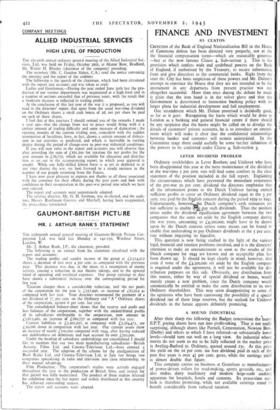FINANCE AND INVESTMENT
15% CUSTOS
CRITICISM of the Bank of England Nationalisation Bill in the House of Commons debate has been directed very properly, not at the the financial compensation terms—which are reasonably generous —but at the now famous Clause 4, Sub-section 3. This is the provision which confers wide and undefined powers on the Bank of England, if authorised by the Treasury, to secure information from and give directives to the commercial banks. Right from the start the City has been suspicious of these powers and Mr. Dalton's attempt to convince the House that they are not intended to be the instrument in any departures from present practice was not altogether successful. More than once during the debate he made it plain that the iron hand is in the velvet glove and that the Government is determined to harmonise banking policy with its larger plans for industrial development and full employment.
One amendment which Mr. Dalton promised is decidedly good, so far as it goes. Recognising the harm which would be done to London as a banking and general financial centre if there should be any suspicion that the banks might be called on to divulge the details of customers' private accounts, he is to introduce an amend- ment which will make it clear that the confidential relationships between banker and customer will remain unimpaired. In the Committee stage there could usefully be some further definition of the powers to be conferred under Clause 4, Sub-section 3.
LEVER DIVIDEND PROBLEM
Ordinary stockholders in Lever Brothers and Unilever who have been disappointed this year at the mere maintenance of the dividend at the war-time 5 per cent. rate will find some comfort in the clear statement of the position included in the full report. Explaining the circumstances which have prevented the immediate restoration of the pre-war to per cent. dividend the directors emphasise that all the information points to the Dutch Unilever having earned sufficient profits to cover an Ordinary dividend equal to the 5 pet cent. rate paid by the English concern during the period 1939 to 1943. Unfortunately, howe.vetiahe Dutch company's cash resources are not sufficient to enable inopay such dividends. Thus -the position arises under the dividend equalisation agreement between the two companies that the sums set aside by the English company during the war years, amounting to £4,300,00o, might have to be drawn upon by the Dutch concern unless some means can be found to enable that undertaking to pay Ordinary dividends at the 5 per cent. rate without impairing its liquidity.
This question is now being studied in- the light of the various legal, financial and taxation problems involved, and it is the directors' intention to make an announcement as soon as the results of the Dutch company for 1944 are known and an acceptable plan has been drawn up. It should be kept clearly in mind, however, that even if none of the £4,300,000 set aside by the English company is required under the agreement, it will not be available for dis- tribution purposes on this side. Obviously, any distribution. from this source, either by way of special dividend or bonus, would merely create a new problem, since the Dutch company would automatically be entitled to make the same distribution to its own Ordinary shareholders. This may seem disappointing to some of the optimists who have been canvassing the possibility of a special dividend out of these large reserves, but the outlook for Unilever dividends in the future appears definitely promising.
A SOUND INDUSTRIAL
After their sharp rise following the Budget concessions the heavy E.P.T. paying shares have run into profit-taking. That is not really surprising, although shares like Purnell, Cementation, Newton Bros. (Derby) and others to which I have referred—at substantially lower levels—should turn out well on a long view. An industrial whose merits do not seem to me to be fully reflected in the market price is Aveling-Barford 5s. Ordinary, quoted around 23s. At this price the yield on the It) per cent. tax free dividend paid in each of the past five years is over 4 per cent. gross, while the earnings yield is almost double that figure.
This company carries on business at Grantham as manufacturers of power-driven rollers for road-making, sports grounds, etc., and also makes dairy machinery and modern large-scale cooking apparatus for hospitals, hotels and canteens. Its peace-time out- look is therefore promising, while net available earnings stand to benefit considerably from reduced taxation.






























 Previous page
Previous page